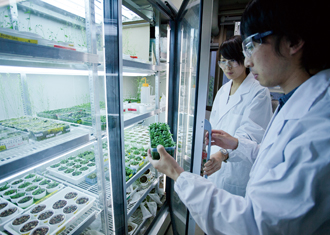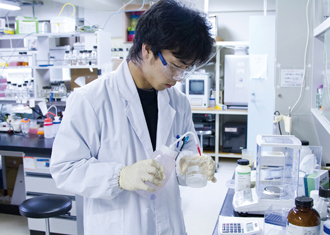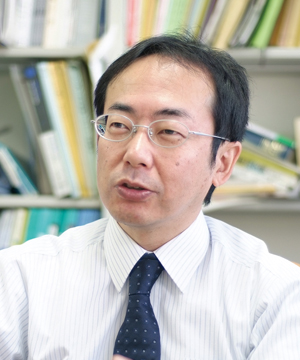Applied Biophysical Chemistry
Learning about the wondrous structures and mechanisms of nature through channel-transporter analysis


Living organisms such as plants, animals and microorganisms contain various kinds of elements and nutrients, which are actually required within the biological membrane. The organism selectively takes up molecule based on factors such as type, timing and age and the needs of the tissues and organs. The role of the checkpoint a kind of "nutrient inspection station" are performed by molecular devices embedded in the biological membrane. Channels and transporters, which mediate the transport of ion and solute across the biological membrane provide resistance to environmental changes and stresses associated with salt and high osmotic pressure (typically salt damage and drought). Our research involves analysis of the critically important channel transporter system at the genetic and molecular level.
With recent advances in structural analysis of soluble proteins, the focus has shifted to the study of more elusive biological membrane proteins. Although the genetics of the membrane transport system are established, their structures, functions and roles remain to be elucidated. In particular, malfunction of membrane transport proteins confer some hereditary disease, and hypersensitive response to abiotic and biotic stress. Analysis and applied research in this area will become important in the future. Our research extends to the biomolecular study of organism, as well as intracellular genes and other mechanisms that regulate the membrane transport system in accordance with changes in the external environment. Our research focuses on molecular and cellular biological elucidation of membrane transport and signal transduction in higher plant cells, microorganism and animal cells using genetic engineering, electrophysiological measurement and cell free transcription, translation and translocation system.
The experiments rarely proceed as planned. We have to accept that failure is an inevitable part of the process, and we have to be persistent. Life is beautiful in its complexity, and the ways in which living organisms function are more incredible than we can imagine. There is an immense satisfaction that comes from pursuing research in new fields and discovering new insights into the structure of living things. And while useful applications for the complex mechanisms of life may not be immediately forthcoming, this work nevertheless has tremendous significance.

Main Research Themes
- Molecular mechanisms in ion channel transporters that control biological membrane information transmission and energy conversion
- Biological membrane engineering
- Environmental stress resistance mechanisms and environmental adaption biology
- Cell-free protein synthesis and cell-free membrane protein formation
- Understanding and controlling gene expressions

Professor of the Biomolecular Engineering at the Graduate School of Engineering
Doctor of Engineering
Nobuyuki Uozumi
Graduated from Okazaki-Kita Senior High School (Aichi Prefecture) in 1982. Completed most of the doctorate course at the Nagoya University Graduate School of Agricultural Sciences before withdrawing in 1989. Appointed professor at the Nagoya University Bioscienceand Biotechnology Center in 2004. Assumed current position in 2007. Indeed, the mechanism of life is really beautiful and astonishing to us. However, living cells comprise molecular materials, and so we are able to understand them at the genetic level, and utilize biochemical materials for our life. It had a profound on me. The most important thing in research is to enjoy our experiments and plan the way forward.

